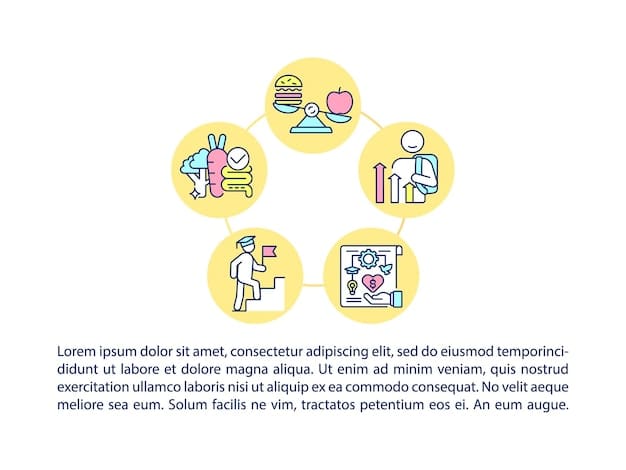Zen & Emotional Intelligence: A Guide to Self-Awareness and Empathy

Zen and emotional intelligence intertwine to foster self-awareness and empathy through mindfulness and meditation, enhancing emotional regulation and interpersonal relationships for a balanced life.
In today’s fast-paced world, nurturing inner peace and understanding our emotions is more critical than ever. Zen and emotional intelligence: Developing self-awareness and empathy offers a unique pathway to achieving this balance, blending ancient wisdom with modern psychological principles. Prepare to explore how these two powerful concepts can transform your emotional landscape.
Understanding the Core of Zen and Emotional Intelligence
Zen and emotional intelligence might seem like distinct concepts, but they share a common ground in fostering self-awareness and emotional regulation. Zen, a school of Mahayana Buddhism, emphasizes meditation and mindfulness as paths to enlightenment. Emotional intelligence (EQ), on the other hand, is the ability to understand and manage our own emotions, as well as recognize and influence the emotions of others. Together, they provide a holistic approach to inner peace and interpersonal harmony.
The Essence of Zen Practices
Zen practices are deeply rooted in meditation and mindfulness. These practices help individuals become more aware of their thoughts, feelings, and bodily sensations in the present moment. By cultivating this awareness, one can gain greater insight into their emotional patterns and reactions.
Key Components of Emotional Intelligence
Emotional intelligence encompasses several key components, including self-awareness, self-regulation, motivation, empathy, and social skills. These components work together to enable individuals to navigate social interactions effectively and manage their emotions constructively.

Zen principles complement emotional intelligence by providing a framework for developing these skills. Through mindfulness and meditation, individuals can enhance their self-awareness and self-regulation, which are fundamental to both Zen practice and emotional intelligence.
How Zen Practices Enhance Self-Awareness
Self-awareness is a cornerstone of both Zen and emotional intelligence. It involves recognizing one’s own emotions, strengths, weaknesses, values, and motivations. Zen practices, particularly mindfulness meditation, can significantly enhance self-awareness by helping individuals observe their thoughts and feelings without judgment.
Mindfulness Meditation for Emotional Clarity
Mindfulness meditation involves focusing on the present moment and observing thoughts and feelings as they arise. This practice allows individuals to become more attuned to their emotional states, recognizing patterns and triggers that may influence their behavior.
Benefits of Regular Meditation
Regular meditation can lead to a greater understanding of one’s emotional landscape. It helps individuals identify and acknowledge their emotions, rather than suppressing or avoiding them. This awareness is essential for managing emotions effectively and responding to situations with greater clarity and composure.
- Reduces stress and anxiety.
- Improves focus and concentration.
- Enhances self-compassion and acceptance.
- Promotes a greater sense of inner peace.
Cultivating Empathy Through Zen
Empathy, the ability to understand and share the feelings of others, is another critical component of emotional intelligence. Zen practices can foster empathy by promoting mindfulness and compassion. When individuals are more aware of their own emotions and experiences, they are better equipped to understand and connect with others on an emotional level.
The Role of Compassion in Zen
Compassion is a central tenet of Zen Buddhism. It involves recognizing the suffering of others and feeling motivated to alleviate that suffering. By cultivating compassion, individuals can develop a deeper sense of connection with others and a greater desire to help those in need.
Practical Ways to Develop Empathy
Developing empathy involves actively listening to others, paying attention to their nonverbal cues, and trying to understand their perspectives. Zen practices, such as loving-kindness meditation, can help individuals cultivate these skills and develop a more compassionate outlook.

Through Zen principles, individuals can learn to approach others with an open heart and a willingness to understand their experiences. This, in turn, fosters stronger relationships and greater interpersonal harmony.
Integrating Zen into Daily Life for Emotional Well-being
Integrating Zen practices into daily life can have a profound impact on emotional well-being. Simple practices, such as mindful breathing and mindful walking, can help individuals stay grounded in the present moment and manage their emotions more effectively. By incorporating these practices into their daily routine, individuals can cultivate a greater sense of inner peace and resilience.
Mindful Breathing Techniques
Mindful breathing involves focusing on the breath and observing the sensations of inhalation and exhalation. This practice can be done anytime, anywhere, and it can help individuals calm their minds and reduce stress.
Mindful Walking Practices
Mindful walking involves paying attention to the sensations of walking, such as the feeling of the feet on the ground and the movement of the body. This practice can help individuals become more aware of their surroundings and reduce feelings of anxiety and overwhelm.
- Set aside dedicated time for meditation each day.
- Practice mindful breathing during daily activities.
- Engage in mindful walking in nature.
- Cultivate compassion through loving-kindness meditation.
By incorporating these practices into daily life, individuals can create a more peaceful and harmonious inner world, leading to greater emotional well-being and resilience.
Overcoming Emotional Challenges with Zen Principles
Life inevitably presents emotional challenges, such as stress, anxiety, and grief. Zen principles can provide valuable tools for navigating these challenges with greater equanimity and resilience. By cultivating mindfulness and acceptance, individuals can learn to observe their emotions without judgment and respond to difficult situations with greater composure.
The Power of Acceptance
Acceptance involves acknowledging and allowing emotions to be as they are, without trying to change or suppress them. This practice can be particularly helpful when dealing with difficult emotions, such as anger, sadness, or fear. By accepting these emotions, individuals can reduce their intensity and find a path towards healing.
Finding Peace in the Present Moment
Zen emphasizes the importance of living in the present moment. By focusing on the here and now, individuals can reduce rumination on the past and worry about the future. This, in turn, can lead to greater peace and contentment.
Through Zen principles of acceptance and mindfulness, individuals can develop a more resilient and resourceful approach to managing emotional challenges, leading to greater overall well-being.
The Science Behind Zen and Emotional Intelligence
While Zen is rooted in ancient wisdom, modern science has begun to validate its benefits. Studies have shown that mindfulness meditation can have a positive impact on brain function, emotional regulation, and overall mental health. Similarly, research on emotional intelligence has demonstrated its importance in various aspects of life, including relationships, career success, and physical health.
Neuroscientific Findings on Meditation
Neuroimaging studies have found that regular meditation can increase gray matter in the brain regions associated with attention, emotional regulation, and self-awareness. Meditation has also been shown to reduce activity in the amygdala, the brain region responsible for processing fear and anxiety.
The Impact of EQ on Overall Well-being
Research has consistently demonstrated the link between emotional intelligence and overall well-being. Individuals with high EQ tend to have better relationships, greater job satisfaction, and improved physical health. They are also more resilient in the face of stress and adversity.
The scientific evidence supporting the benefits of Zen and emotional intelligence provides further validation for their integration into daily life. By combining ancient wisdom with modern science, individuals can unlock their full potential for emotional well-being and interpersonal harmony.
| Key Aspect | Brief Description |
|---|---|
| 🧘 Mindfulness | Practice of focusing on the present moment without judgment. |
| ❤️ Empathy | Ability to understand and share the feelings of others. |
| 🧠 Self-Awareness | Recognizing your own emotions, strengths, and weaknesses. |
| ⚖️ Emotional Regulation | Managing and responding to emotions effectively. |
Frequently Asked Questions
▼
The primary goal of Zen practice is to achieve enlightenment through self-awareness and understanding the nature of reality. It involves meditation and mindfulness.
▼
Emotional intelligence enhances relationships, improves communication, reduces stress, and increases overall well-being by fostering self-awareness and empathy.
▼
Zen practice is accessible to everyone, regardless of their background or beliefs. Simple daily exercises like mindful breathing and meditation can be practiced by anyone.
▼
Even short, regular meditation sessions of 10-20 minutes daily can lead to significant improvements in emotional well-being and self-awareness over time.
▼
If your mind wanders during meditation, gently guide your attention back to your breath or chosen point of focus without judgment. Wandering is a natural part of the process.
Conclusion
Integrating Zen practices with emotional intelligence offers a powerful pathway to self-awareness, empathy, and overall well-being. By incorporating mindfulness and meditation into daily life, individuals can unlock their full potential for emotional harmony and interpersonal success, navigating life’s challenges with greater resilience and peace.





